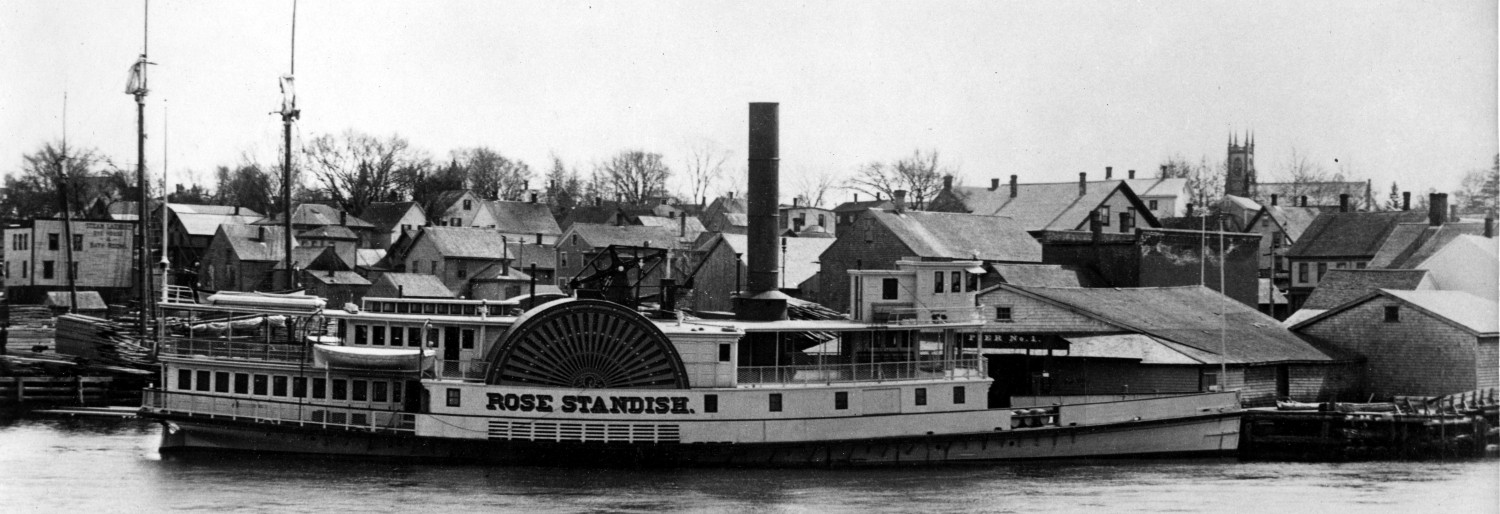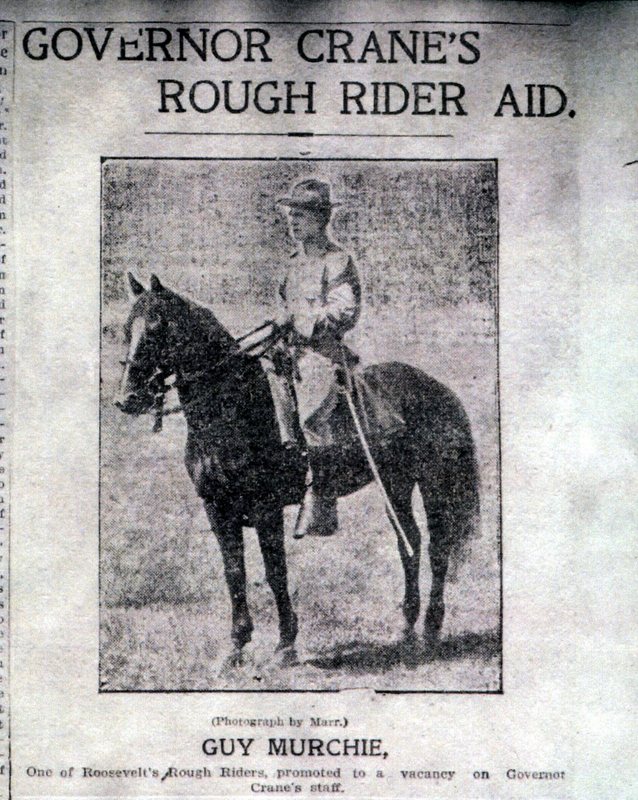
One of the more interesting personalities in St. Croix Valley history was Guy Murchie, son of William and Ella Murchie. The Murchie’s were one of the most prominent “lumber baron” families of the St. Croix with substantial timber holding and mills on both sides of the border. Some may remember the William Murchie home on Church Street between St. Anne’s Church and Washington Street. In the 1960s, it was the home of Attorney Francis Day, and occupied the hill just across from the high school.

The Murchie house was demolished in 1964 to make way for the new post office, but for nearly a century it was one of the nicest homes in Calais.
Guy grew up in the house, attended Calais Academy and graduated in 1895. Over his long and eventful life he fought bravely in Cuba alongside future president Teddy Roosevelt, graduated from Harvard law school and became a prominent lawyer in Boston, married into Boston’s upper crust, precipitated a sensational scandal in the early 30s when he swapped his second wife (a childhood sweetheart) for a rich divorcee from Montreal, and in the 1930s decamped to the Bahamas to write books including one of the few histories of the St. Croix Valley – A Sentinel River. Through all of his adventures and wanderings he always maintained his connection with the St. Croix Valley.
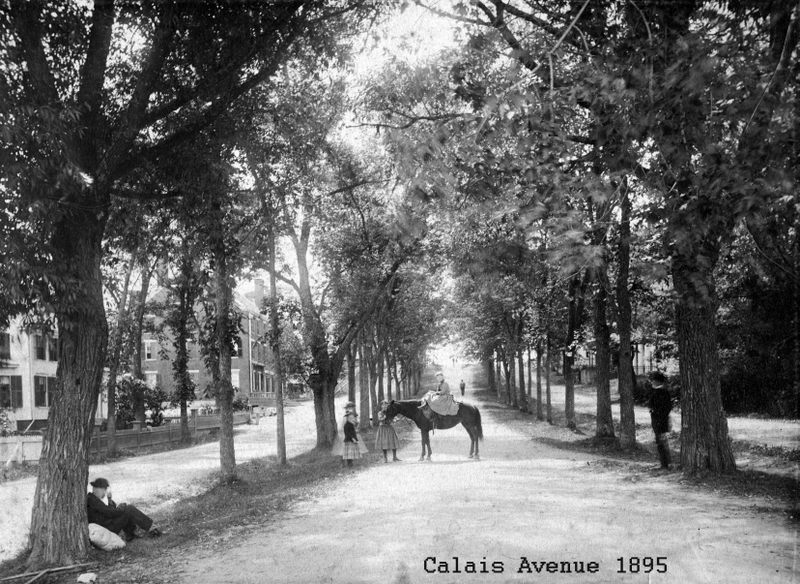
Guy Murchie’s Calais in 1895 was a vibrant and beautiful city. Lovely homes fronted tree lined streets like Calais Avenue which Guy surely walked regularly, and he no doubt knew the young lady on the horse and the rest of the people in the photo.
Guy was a good student and left Calais in the fall of 1895 for Harvard College. At Harvard he was a protege of another Calais notable – Charles Copeland, then an eminent lecturer in literature at the school. At Harvard, he excelled both academically and on the playing fields, and by 1898 was enrolled in Harvard Law School. However, on February 15th of that year the battleship Maine was sunk by an explosion of unknown origin in Havana Harbor, and the outcry to avenge the Maine resounded across the country. War was declared, and the young men of Calais and Harvard, were eager not to miss the fight. Calais raised a company for the war in record time.
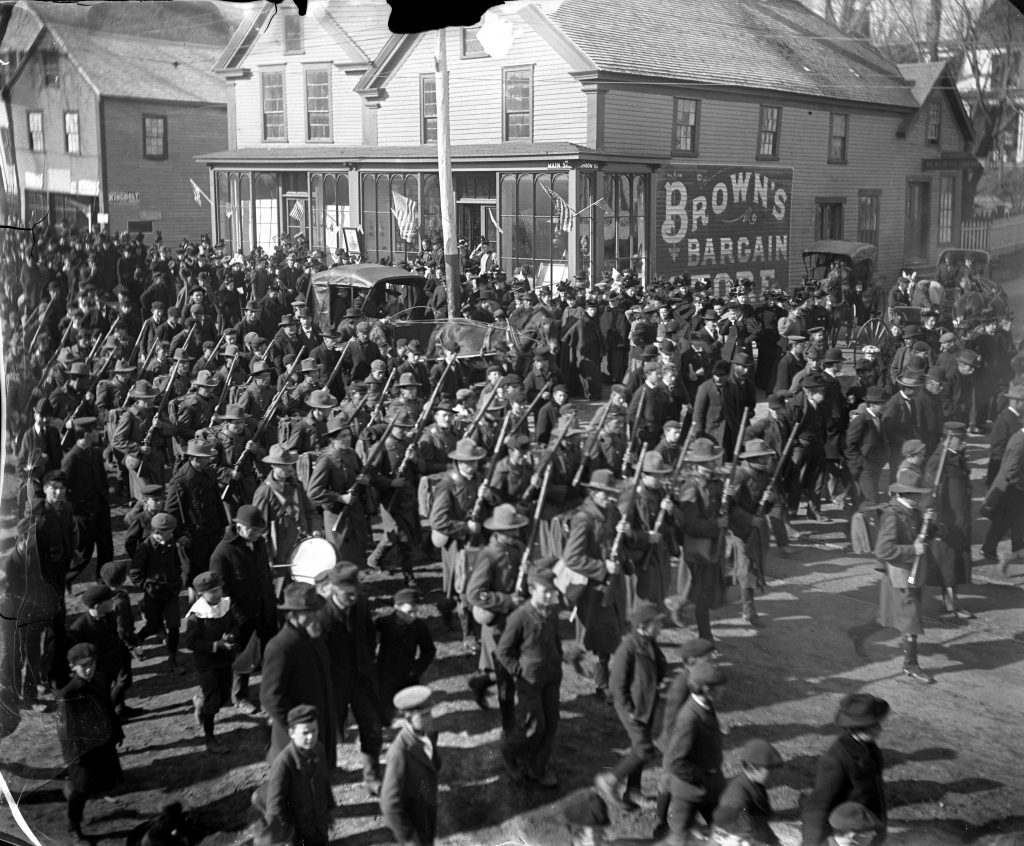
Guy Murchie was also eager to avenge the sinking of the Maine, which, we must, for historical accuracy, point out was almost certainly a boiler accident and not the fault of the Spanish, but this mattered little given the press induced hysteria at the time. From the Boston Globe 1898:
Boston Globe May 1898:
LEADERS IN THE COLLEGE LIFE.
Ten Men at Harvard Will Ride with Roosevelt
Drilling at the University Continues Faculty Acts.
There is no great excitement at Harvard over the war, but the men continue to enlist in the different regiments. Ten students have gone or are to go to San Antonio, Texas, to join the first United States cavalry, the regiment of the Hon Theodore Roosevelt is to be one of the officers. All of the men are very prominent in college and university life. At the head of the list is Guy Murchie, of Calais, Me, of the law school, who coached the freshman football eleven last fall.
Murchie served with distinction in Cuba as acknowledged by Teddy Roosevelt himself in his account of the war:
London Standard 14 July 1899:
Roosevelt writes: ” In all the world there could be no better material for soldiers than that afforded by these game hunters of the mountains, these wild rough riders of the plains. They were accustomed to handling wild and savage horses; they were accustomed to following the chase with the rifle, both for sport and as a means of livelihood. Varied though their occupations may have been almost all had, at one time or another, herded cattle and hunted big game. They were hardened to life in the open, and to shifting for themselves under adverse circumstances. They were used to all their lawless freedom, to the rough discipline of the round-up and the mining Company. Some of them came from the small frontier towns; but most were from the wilderness, having left their lonely hunters’ cabins and shifting cow-camps to seek new and more stirring adventures beyond the sea.” Of a higher social standing but taking not less kindly to the hardships of camp life, were the Volunteers who came from New York and other cities. Provided a recruit could ride and shoot, he was not disqualified if he happened to be a gentleman; and the Volunteers from Harvard or the Knickerbocker Club turned out just as good soldiers as the cowboys. With hardly an exception, their Colonel declares, they bore themselves admirably. No work was too hard, or too disagreeable, or too dangerous for them; nor were they disappointed at having to take their chance in the ranks without prospect of promotion or special distinction. Few of the names mentioned will convey any meaning, perhaps, to English readers, but the facts given speak for themselves. The Harvard contingent was practically raised by Guy Murchie, of Maine. He saw all the fighting and did his duty with the utmost gallantry, and then left the service as he had entered it, a trooper, entirely satisfied to have done his duty and no man did it better.
After the war, Murchie returned to Harvard and he completed his legal education in 1899. He was admitted to the Massachusetts Bar and began practising law in Boston where he made an immediate impact on the legal, political and social scenes. In 1902, he married Agnes Donald, daughter of the rector of Boston’s famous Trinity Church. Of Murchie, a Boston paper had this say on his selection in 1902 as an aide to Governor Crane of Massachusetts:
Guy Murchie’s Career
Courageous and Clever Are Characteristics That Have Made Gov Crane’s New Aide Famous In War And Peace
To be an aide on the staff of the governor of Massachusetts and to have been the subject of praise from the President of the United States are honors that come to but few men at 29 says the Boston Advertiser.
Guy Murchie is a rising young lawyer who attributes some measure of his successes to the fact that he comes from Maine. His father is a prominent merchant of Calais.
Murchie career at Harvard will be recalled as that of a prominent society man distinguished in athletics. He still retains his interest in football, as he has been the coach of the freshman and assistant to the varsity for two years past. He is now mentioned as a strong candidate for the head position on the varsity.
Admitted to the bar in ’99 Mr. Murchie began his legal profession in the legal department of the Boston Elevated road. After a years’ service there he became associated with W. M. Butler and G.W. Cox in the Tremont Building, where he has since continued the practice of law. His bent is in the direction of executive law or the exercise of legal functions that settle disputes without the recourse to the courts.
In 1900 he was appointed on the staff of Gen, Bancroft’s Second Brigade. Upon Gen. Bancroft’s resignation Murchie accepted an invitation to go on the staff of Gen, Matthews of the First brigade. He is not without experience as a staff officer and will feel at home as an aide to Gov. Crane with whom he has long been acquainted.
“He saw all the fighting and did his duty with upmost gallantry” says Pres. Roosevelt of Murchie in the former’s book on the Rough Riders. Murchie PRACTICALLY RAISED THE Harvard contingent at Roosevelt’s suggestion and was himself in the troop with famous Capt. “Bucky” O’Neil who fell at San Juan.
Murchie met Gov-Gen Wood before the famous campaign. Last winter he went to Cuba as a guest of the Governor, of whom he is an enthusiastic admirer.
Murchie has made a host of friends during his comparatively short residence in Boston. “You can say nothing of him that isn’t good, and he can say nothing that isn’t clever,” says a prominent Bostonian.
On January 25, 1907 his son Guy Jr. was born and…
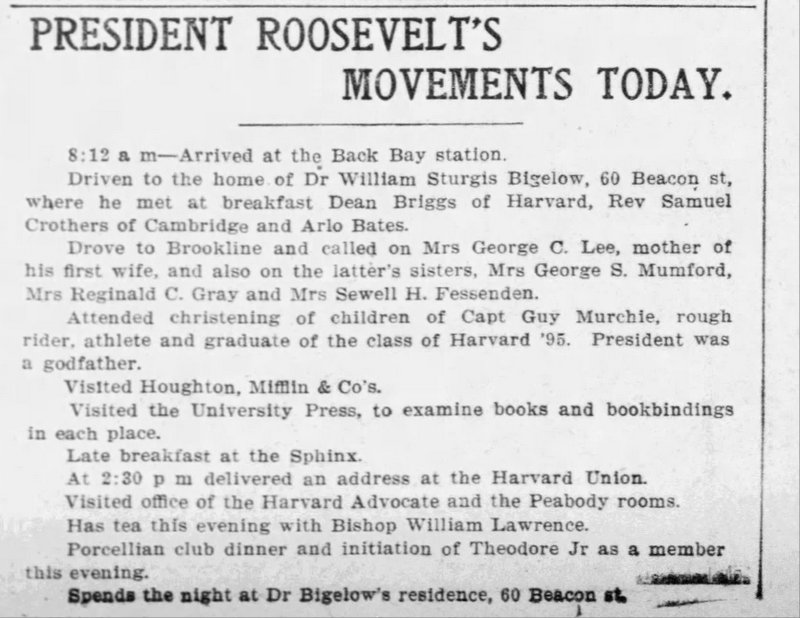
… the boy’s godfather, President Theodore Roosevelt attended the christening.
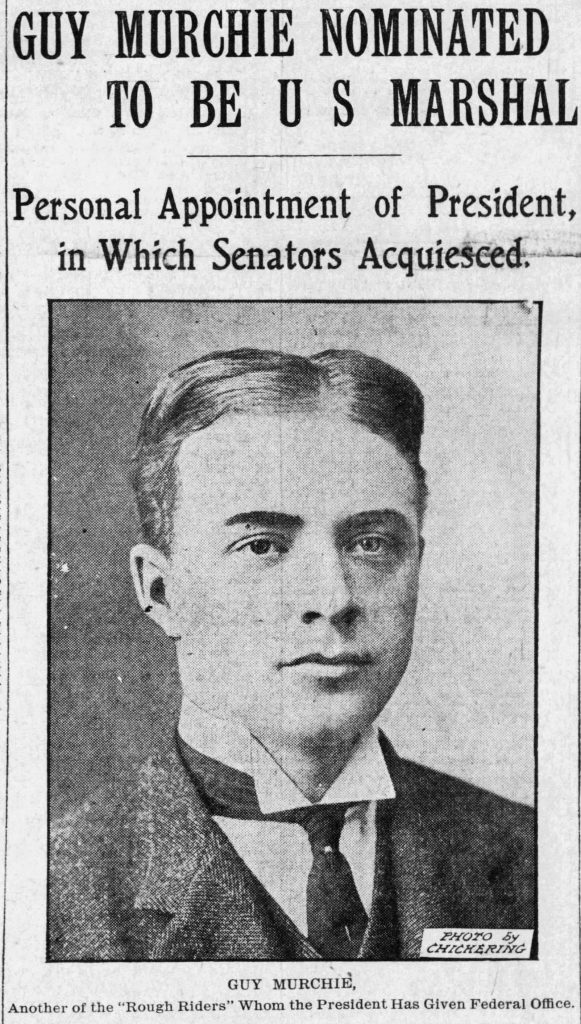
A year later President Roosevelt appointed Guy Murchie U.S. Marshall in Boston, which at the time was a very prestigious position. Murchie served as U.S. Marshall until 1915.
Murchie and Agnes continued to be important players in Boston society and eventually had four children. During World War 1, Murchie and Roosevelt were rumored in the papers to be raising two machine gun divisions to fight in Europe. Murchie was then the head of the National Security League, an organization of distinguished and influential Americans who, according to Wikipedia was “an American patriotic, nationalistic, nonprofit, nonpartisan organization that supported a greatly-expanded military based upon universal service, the naturalization and Americanization of immigrants, Americanism, meritocracy, and government regulation of the economy to enhance national preparedness.”
When Agnes died after the war, Guy married a childhood sweetheart from Calais, Jane Eaton Cotton. She was the widow of Joseph Cotton, a prominent Boston manufacturer and the bride and groom were from two of Calais’s most prominent families – the Murchies and the Eatons. The couple honeymooned in Europe and upon returning settled into a prominent position in Boston society. Guy served on numerous commissions in the city and played an important role in Boston Republican politics. Guy and Jane appeared the quintessential Boston power couple until all went awry in 1931 when Guy took a European vacation with another woman.
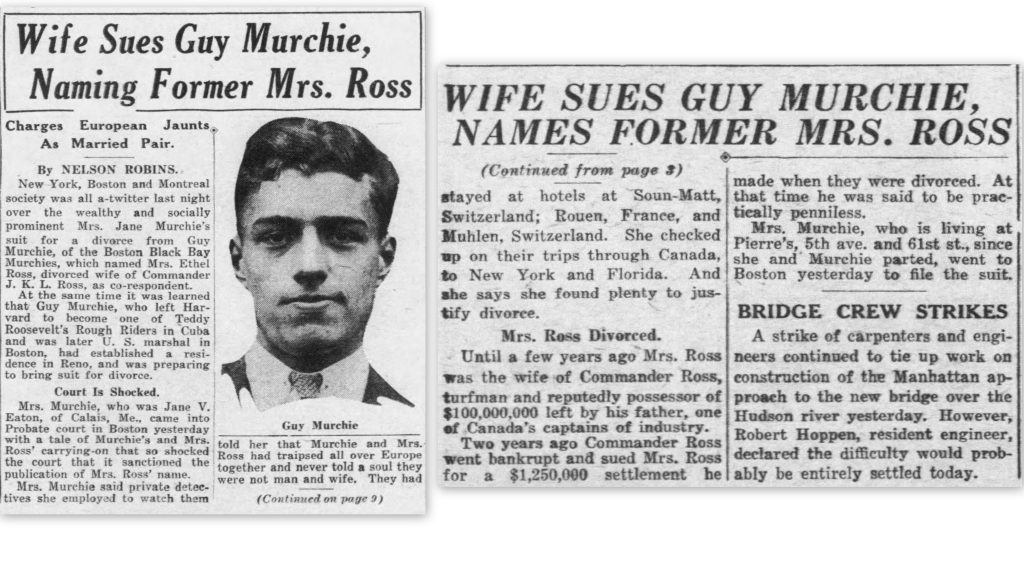
The New York Daily News of February 7 1931 claims the Court found Guy’s conduct “shocking”
Wife Sues Guy Murchie, Naming Former Mrs. Ross
Charges European Jaunts As Married Pair.
By NELSON ROBINS.
New York, Boston and Montreal society was all a-twitter last night over the wealthy and socially prominent Mrs. Jane Murchie’s suit for a divorce from Guy Murchie, of the Boston Black Bay Murchies, which named Mrs. Ethel Ross, divorced wife of Commander J. K. L. Ross, as co-respondent. At the same time it was learned that Guy Murchie, who left Harvard to become one of Teddy Roosevelt’s Rough Riders in Cuba and was later U. S. marshal in Boston, had established a residence in Reno, and was preparing to bring suit for divorce.
Court Is Shocked.
Mrs. Murchie, who was Jane V. Eaton, of Calais, Me, came into Probate court in Boston yesterday with a tale of Murchie’s and Mrs. Ross’ carrying-on that so shocked the court that it sanctioned the publication of Mrs. Ross’ name. Mrs. Murchie said private detectives she employed to watch them told her that Murchie and Mrs. Ross had traipsed all over Europe together and never told a soul they were not man and wife. They had stayed at hotels at “Soun-Matt, Switzerland; Rouen, France, and Muhlen, Switzerland. She checked up on their trips through Canada, to New York and Florida and she says she found plenty to justify divorce.
Mrs. Ross Divorced.
Until a few years ago Mrs. Ross was the wife of Commander Ross, turfman and reputedly possessor of $100,000,000 left by his father, one of Canada’s captains of industry.
Two years ago Commander Ross went bankrupt and sued Mrs. Ross for a $1,250,000 settlement he made when they were divorced. At that time he was said to be practically penniless. Mrs. Murchie, who is living at Pierre’s, 5th Ave. and 61st St, since she and Murchie parted, went to Boston yesterday to file the suit.
The New Boston Paper of the same date found the scandal very titillating:
Boston Raises Lorgnettes as Murchies Tilt (Special to The New Boston, Feb. 7.
Back Bay’s staid social dowagers toppled from their rocking chairs in a mad scramble for lorgnettes and smelling salts when Mrs. Jane Eaton Murchie sued Guy Murchie for a divorce today. – – ; The matron, “who walked with presidents, nor has she lost the common touch,” described herself in canned press copy which her publicists gave reporters as “a social favorite in practically every large city in the world.” Before she joined Boston’s ne plus ultra set by her marriage to Murchie, the former Jane Eaton was a resident of Calais, Me. In her publicity barrage Mrs. Murchie stressed the point that the late President Theodore Roosevelt had been godfather for Murchie’s son, Donald. Murchie is in Reno, where he will also sue for divorce. Mrs. Murchie in her suit here named as co-respondent Mrs. Ethel Ross, divorced wife of Commander J. K. L. Ross, Canadian turf figure and sportsman. , Although she has lived at Pierre’s in New York since her separation from her husband, Mrs. Murchie said, through her public relations counsel: “I think it is more dignified to sue in Boston, where my husband and I are both known, on grounds that will be recognized the world”
By the second week of March, Guy had obtained a Vegas divorce and he married Mrs. Ross on March 19th. In May of 1931 Jane sued Mrs. Ross, now Mrs Murchie for alienation of affections demanding $250000. The case was settled for $50000 two years later which, while a substantial sum in the 1930s, hardly dented the settlement Mrs. Ethel Ross Murchie had been awarded in her divorce from Mr. Ross.
In an unresolved twist to the case, Mr. Ross, Guy’s new wife’s ex, had gone bankrupt after the divorce from the now Mrs. Murchie and demanded the return of the settlement but we do not know the outcome of that case. Jane Eaton Murchie was certainly not standing in depression food lines. Staying at Pierre’s in New York while the litigation was unwinding must have been pricey. The cheapest room at Pierre’s today is just south of a thousand dollars a night.

Guy and Ethel also managed to avoid the hardships of the Depression by moving to Nassau in the Bahamas, where Ethel died in the early 1940s. They purchased Ballycrystal, the stunning Holt mansion which can be seen above in a recent photo. Guy Murchie also spent a good deal of time in the summer in his beloved St. Croix Valley – usually in St. Andrews and as late as 1954 he was asked to serve as a trustee of the newly formed St. Croix Historical Society.
Much of Murchie’s time locally was devoted to research on his local history – “St Croix The Sentinel River” was published in 1947 – but he also found time to visit all the places in England that had any connection to the poet Keats in preparation for his work published in 1955 – “The Spirit of Place in Keats”. There was much tragedy in his life, of his four children he outlived all but his son Guy, who himself was a author of some repute. His “Song of the Sky” was Book of the Month Club selection in 1954 and received the Book of the Year Award. Guy Jr served as a war correspondent for the Chicago Tribune during the Second World War and was wounded in France. He was very spiritual and a member of the Bahai faith about which he wrote extensively.
Guy Murchie died at age 85 in Nassau, survived by his fourth wife Louise. He was a fascinating man of many talents and interests who left his mark on the St. Croix Valley with the publication of The Sentinel River in 1947.
For all his personal and professional success he never forgot his roots.
